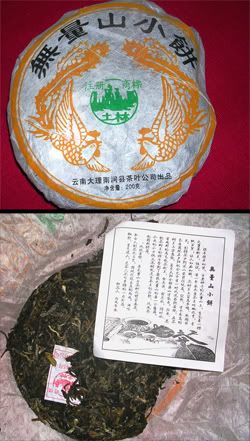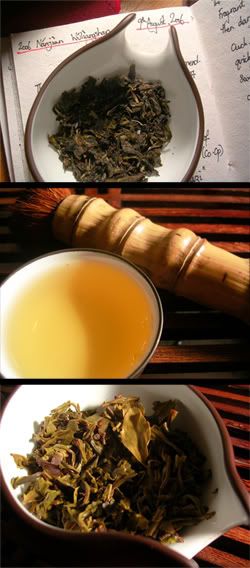 This is a xiaobing [small cake], again recommended by Scott of Yunnan Sourcing. The Nanjian Factory, one of the elders (founded 1983) started making bingcha in 1998, following a history of Tuocha manufacture, being located in Xiaguan territory.
This is a xiaobing [small cake], again recommended by Scott of Yunnan Sourcing. The Nanjian Factory, one of the elders (founded 1983) started making bingcha in 1998, following a history of Tuocha manufacture, being located in Xiaguan territory.The tea is apparently a mixture of 40% Wuliangshan leaves, and 60% Mengku-region Lincang, which the factory mentions is due to the lighter flavours of the small-leaf Wuliang. It is claimed that this is the traditional manner of making Nanjian cakes.
Dry leaf:
Dark, broken, and small - this is particularly green leaf, with a decent aroma of mushroom - it's attractive, though clearly a mixture.
Dark, broken, and small - this is particularly green leaf, with a decent aroma of mushroom - it's attractive, though clearly a mixture.
The soup starts out particularly cloudy, and this isn't a clean tea. That's not necessarily a bad thing, but reminds me of Chen Guang-He Tang cakes.
 This tea has a considerable quantity of ku, presumably delivered by the larger Lincang leaves. The sweet, low aroma corresponds with the generally thin set of low "tea" flavours.
This tea has a considerable quantity of ku, presumably delivered by the larger Lincang leaves. The sweet, low aroma corresponds with the generally thin set of low "tea" flavours.Later infusions become truly, absurdly sweet - is this Wuliang terroire? It is not a leaf with which I have much familiarity. What initial complexity existed courtesy of the low, bass flavours soon recedes to a simple "green" quality - with that correspondingly acerbic quality in the throat that one might expect.
Wet leaves:
Tiny, chopped, and exceedingly green.
Overall:
This tea is neither particularly friendly nor particularly noteworthy, except for its highly active ku. I remember considering this "aggressive" in my original tasting, and I stand by that observation.
Rather uninspiring, unfortunately enough. At a trifling $6, at least it makes no claims to high status.

No comments:
Post a Comment
(and thanks)